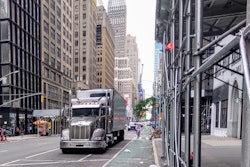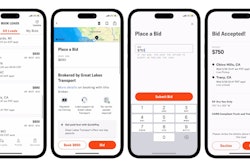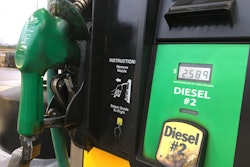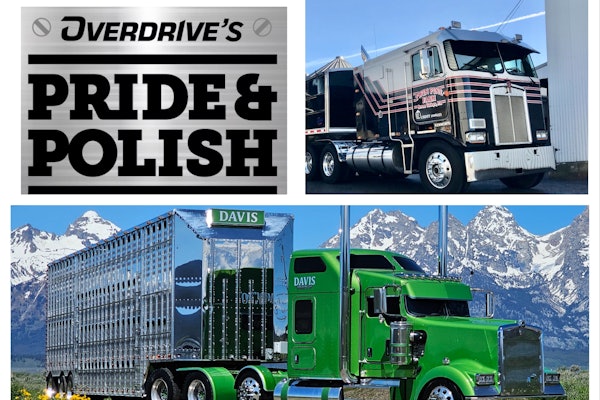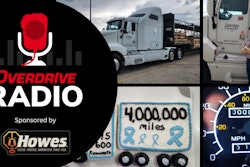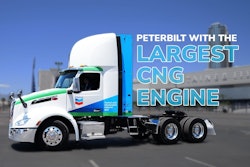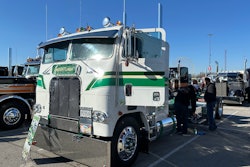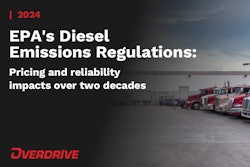The National Owner Operators Association's relatively new leasing program got off to a rocky start earlier this year when Thomas Russell Holland, a former police officer turned small trucking business owner, alleged that NOOA President Michael Boston skimmed money off him in a "scam" operation.
Holland plans to sue Boston for about $4,090 Boston still owes him, Holland said, from the final loads, and for what Holland called "fraudulent misrepresentation."
NOOA representatives pushed back on Holland's claims both as to sums of money and his descriptions of their business dealings. But looking at NOOA's lease agreement, and speaking to its representatives, it's difficult to discern what exactly the carrier arrangement offers to owner-operators looking to lease on.
First the facts that Holland and Boston don't dispute: NOOA uses a foreign dispatch service based in Pakistan to negotiate load board freight, sometimes from big brokers like C.H. Robinson that Boston has personally vowed to boycott; NOOA leased Holland on to a newly reinstated MC number with motor carrier authority.
Holland also admitted that he sold his own old MC number when times got tough last year to a buyer he knew nothing about.
"All I know is I needed money and somebody wanted it so I sold it," Holland said of his carrier authority.
The practice of buying MC numbers "screams fraud," fleet owner and freight fraud vigilante Matthew Patrick previously told Overdrive. NOOA didn't think too highly of Holland selling his MC, either, but they proceeded to sign him on as their first-ever leased owner. Since the sale, Holland's old number is now showing as "Inactive" in FMCSA's Safer company lookup system.
Importantly, Holland admits he only "skimmed" the lease agreement with NOOA.
That's pretty much the cardinal sin for entering a contract, and an article on Holland's lease with NOOA could end right here. Most owner-operators will know it, but it bears repeating: Read the contracts that you sign and don't sign contracts you didn't read.
The story doesn't end there, though. Rather than let the facts of the case and the contract speak for themselves, Boston has been extremely vocal on social media, attacking Holland's health status and his full-time employment outside of trucking. Boston also alleged he himself had been threatened by unknown people with serious harm after Holland took to social media himself with his claims.
What is the National Owner Operators Association?
Regular readers will know that NOOA bills itself as a trade association for owner-operators that offers services such as a branded multi-service card for fuel and maintenance, dispatch and, as was the case for Holland, an owner-operator lease program.
Jayme Anderson, listed on NOOA's website as head of the Carrier Division, said he's built over a long trucking career a network of brokers and shippers that keep his truck loaded and hauling well above posted rate averages. Anderson, along with other NOOA members, accuse DAT Freight & Analytics of misrepresenting rate averages, and in January promised to release their own dataset that would counter the load board's numbers, which has yet to materialize. Recent polling showed a majority of Overdrive readers similarly don't trust rate averages from firms like DAT.
[Related: Broker margins, rates data, transparency: What owner-operators really think]
The way Anderson described his network of brokers and shippers isn't what NOOA's first leased owner claims to have seen when his driver started hauling loads for them. Rather, Holland saw load board freight when he joined the Boston-launched leasing program, which bills itself as "NOOALOGIX Virtual Carrier." (Boston recently handed the reigns of NOOA's lobbying and advocacy efforts over to someone else.)
NOOA said Boston invests $2,600 per truck "to ensure proper coverage and compliance," including insurance, though Holland was responsible for weekly insurance payments and filed his own IFTA.
Overdrive asked NOOA to provide tangible examples of what their advocacy work has achieved, or if they're working toward any meaningful milestones, and they repeatedly refused to answer.
NOOA made headlines in 2023 for an announced "national shutdown" and boycott of TQL and other big brokers, but NOOA's own virtual carrier booked loads with C.H. Robinson as recently as this year, and no national shutdown of any sort materialized. Quite the opposite: the period has been marked by low rates, excess capacity and carrier authority revocations as many fleets and smaller trucking businesses struggle.
Overdrive asked some other pretty simple questions while reporting this story.
How many paying members does the organization have? NOOA wouldn't answer. NOOA's website claims there are 35,000 members, but that's more likely a reference to the group's Facebook page, which has about 40,000 followers. In November 2023, Boston indicated in a conversation with Overdrive the paid-member number was well less than 1,000 at the time, and that it may have been significantly lower.
Boston at one point claimed NOOA was a nonprofit, but a search of the IRS database of nonprofits revealed no organizations by that name. Overdrive asked NOOA to provide the name of it's nonprofit, but NOOA didn't answer.
None of the five NOOA members Overdrive spoke to reported paying dues or receiving any money from the organization, and they all indicated that only Boston touches the money, if there is any beyond what Holland paid him. In fact, Overdrive has never spoken to a dues-paying NOOA member.
Boston worked with an engineering team to create a NOOA load board, but it hasn't quite taken off. One mid-size broker said Boston offered him a "good chunk" of money to post loads to the board. The broker rejected the offer for cash, not wanting to be beholden to NOOA. The broker said Boston didn't give any specifics of how many NOOA member carriers might populate the board, and that they're still considering posting.
Holland's path to the NOOA lease contract
Holland didn't closely read the lease contract, but he did follow the larger story NOOA told about its advocacy and mission to support owner-operators. Having recently tangled with a faulty third-party authority monitoring service's report on his company, which all but eliminated him from being a player on load boards, Holland found himself moved by Boston's message in his Facebook group.
[Related: Hey brokers, Holland Logistics is in fact an authorized carrier]
"I thought I was getting factoring, a good long-running MC number to use and a dispatching division that was amazing," Holland said of the lease agreement.
But a look at the NOOA contract Holland shared with Overdrive, and the truck owner's time with the carrier, shows none of that was guaranteed, and it didn't always go to plan. The contract states NOOA was entitled to 20% of revenues from loads booked, and spells out some of Holland's expense liabilities.
You can read the lease agreement Holland shared here.
Holland contends that the contract, which states insurance will cost $250 a week, knowingly obscured the real costs of the arrangement. NOOA does not deny that, in reality, Holland ended up paying $375 a week for insurance, but contends that the contract covers that.
"You cannot hide costs in a contract and make somebody sign based off of one figure, knowing it’s another," said Holland. "The contract is poorly written, they should redo it. That is fraud" as Holland sees it, "and I’m tired of hearing them say otherwise."
NOOA spokespeople, however, pointed toward a contract clause stating Holland was responsible for "Unpaid or due and owing premiums for any insurance required by this agreement to be purchased by Contractor."
Holland disagrees, and referenced his plans to sue -- assuming he follows through on the threat, a court will decide the merits of the case he brings.
The copy of Holland's contract with NOOA he provided was reviewed with owner-operator business coach Gary Buchs, who spent nearly two decades leased to Landstar before retiring from the road in 2019. From a basic business standpoint, Buchs took issue with one clause in particular: "Contractor [Holland, that is] is responsible for payment of the full invoice billed until it’s paid by the brokers or shippers."
Buchs summed his thoughts about the clause this way: "You get to pay for everything we tell you you've got to pay for, including if the customer doesn’t pay the freight bill. You still have to pay us."
This did become an issue to an extent. Jennifer Chrestman, NOOA's corporate debt collection service provider, said that the Holland-Boston collaboration fell victim to a broker scam.
"One of the loads that [Holland] says he was not paid for" was a truck order not used (TONU) situation "from a broker that turned out to be a scam, so no one was paid for that $400," she said.
Holland also said Boston uses a New York address on some business paperwork, pays IFTA in Pennsylvania and lists a Texas address on his authority's filing. That filing only lists one truck and one driver under the Wm On Time Trucking LLC authority, dba NOOA.
The company said that's an accurate MCS-150 filing, because they only had Holland's single truck and driver operating under the authority.
The search of the Texas address, though, leads to a business called Premier Parking, which operates a valet lot near Midland International Airport. A Premier Parking representative said he wasn't aware of any trucking businesses at that address.
[Related: FMCSA to end MC numbers, overhaul registration system to stamp out fraud]
"Some of this information may still be reflective of old records," a NOOA spokesperson said of the many addresses. "However, this should not be an issue for any drivers as they are required by contract to handle their own IFTA."
Outdated MCS-150 information can be a problem for carriers' ability to maintain insurance. Buchs offered this hypothetical: "Let’s say you went from one truck to half a dozen and then don’t report it" on your MCS-150 filings, said Buchs. "And then you get put out of service or [get] a violation. If you don’t update that information you’re basically saying one truck caused all these problems, so there's no way you could even maintain insurance."
Former owner-op and trucking insurance agent Joel Baker in February made clear how important an accurate, updated MCS-150 is for keeping insurance costs in check.
Insurance cost surprises represented a big issue for Holland in his dispute with NOOA over the agreement. To Buchs' reading of the contract, he noted "revenues aren't defined or differentiated from reimbursements," noting the Landstar contracts he was most familiar with, among others he's seen working with owners, made it a priority to exhaustively define and list those items.
In NOOA's contract with Holland, "it's basically defined as 'anything we think you owe us, we’re going to keep,' to put it in layman’s terms," Buchs added. "There's nothing in there for a fuel surcharge or accessorials that I could find."
What if the driver earned some layover or detention pay? "Are they going to take 20% of layover pay?" Buchs offered as another hypothetical. The question isn't answered by the contract's basic terms. Buchs felt a contract's lack of specificity could be used "just like a vacuum sucking the money away from the contractor."
On two occasions, Boston took a factoring fee out of Holland's settlement checks, which Holland called a theft.
NOOA said the missing money "could have been a simple bookkeeping oversight" in response to Overdrive, but did not offer to look into it or pay Holland back.
Boston insists that Holland averaged $2.60/mile on loads, but Holland said that's only loaded miles, and that the load board freight coming from the Pakistan-based dispatcher had his driver deadheading for hundreds of miles a week. Holland showed records of dispatch sending him flatbed loads from Arizona into Texas at $1.62/mile and back to Arizona shortly after at $2.42/mile loaded.
But aside from the insurance charge question and a few percentage points off a couple settlement checks, even Holland admits that NOOA lived up to its end of the contract, which does not guarantee success, revenues or direct relationships with shippers. NOOA spokespeople claimed that Holland's grievances could have been rectified if carried out through the proper channels and not on social media, where NOOA and Holland's fight erupted.
Holland said he tried to rectify the situation internally, yet it didn't work.
During the social media flame war, Boston tweeted that his organization was "committed to combating the spread of misinformation and disinformation" and urged "all users of social media to think critically about the information they encounter online."
Boston said he made money from Holland's tenure with the carrier, but Holland said on balance he lost money during the lease.
"I lost thousands each month," said Holland, who paid his driver a salary the short nine weeks the contract was in effect. "And when I would tell Mike, ... he said that I just didn't know how to run a business. But once I left him, I am now making good profits" leased to a family member's company, he said. "Mike made a lot of money off me, though, and that's all he cares about."
One simple way for NOOA to counter Holland's claims might be to present other leased owners who are doing well or like the program. Overdrive asked NOOA if there was another leased owner who might speak to their experience under the lease contract, even anonymously, but NOOA declined.
Reps cited the heat they take on social media.
[Related: Trucking Law: Your rights under leasing regulations]


